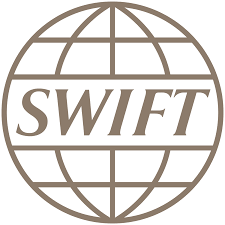CURRENT AFFAIRS
Get the most updated and recent current affair content on Padhaikaro.com
The Society for Worldwide Interbank Financial Telecommunication (SWIFT)
- Vaid's ICS, Lucknow
- 05, Mar 2022

Why in News?
What is the news?
As tensions are increasing between the US and Russia over the Ukraine issue, experts have said that the United States could as a last resort exclude Russia from the Society for Worldwide Interbank Financial Telecommunication (SWIFT).
What is SWIFT?
SWIFT is a messaging network used by banks and financial institutions globally for quick and faultless exchange of information pertaining to financial transactions.
The network connects more than 11,000 banking and securities organizations in over 200 countries and territories.
Headquarters: Belgium
How does SWIFT work?
Each participant on the platform is assigned a unique eight-digit SWIFT code or a bank identification code (BIC).
If a person, say, in New York with a Citibank account wants to send money to someone with an HSBC account in London, the payee would have to submit to his bank the London-based beneficiary’s account number along with the eight-digit SWIFT code of the latter’s bank. Citibank would then send a SWIFT message to HSBC. Once that is received and approved, the money would be credited to the required account.
Note: SWIFT is merely a platform that sends messages and does not hold any securities or money. It facilitates standardized and reliable communication to facilitate the transaction.
How is SWIFT governed?
SWIFT is owned and controlled by its shareholders (financial institutions) representing approximately 3,500 firms from across the world. The shareholders elect a Board of 25 independent Directors representing banks across the world, which governs the Company and oversees the management of the Company.
SWIFT is overseen by the G-10 central banks (Belgium, Canada, France, Germany, Italy, Japan, The Netherlands, United Kingdom, United States, Switzerland, and Sweden) as well as the European Central Bank (ECB), with its lead overseer being the National Bank of Belgium.
In 2012, this framework was reviewed, and the SWIFT Oversight Forum was established in which the G-10 central banks are joined by the central banks of India, Australia, Russia, South Korea, Saudi Arabia, Singapore, South Africa, the Republic of Turkey, and the People’s Republic of China.
What happens if one is excluded from SWIFT?
If a country is excluded from SWIFT, its foreign funding would take a hit, making it entirely reliant on domestic investors. This is particularly troublesome when institutional investors are constantly seeking new markets in newer territories.
Are any countries excluded from SWIFT?
Iranian banks were ousted from the system in 2018 despite resistance from several countries in Europe.
Source: This post is based on the article “What is SWIFT and why is Russia being threatened with exclusion from the service?” published in Indian Express on 9th Feb 2022.
Facts for Prelims :
Montreux Convention:
Turkey is set to implement Montreux convention on naval passage through Bosporus and Dardanelles straits. This would allow Turkey to limit the movement of Russian warships between the Mediterranean Sea and the Black Sea.
What is the Montreux Convention?
Montreux Convention is an international agreement governing the Bosporus and Dardanelles Straits in Turkey. The convention was signed in 1936 at the Montreux Palace in Switzerland.
The convention gives Turkey certain control over the passage of warships from the Dardanelles and Bosphorus Straits.
Peacetime passage: Warships can pass the straits by prior diplomatic notification with certain limitations on the weight of the ships and arms they carry — and depending on whether the ship belongs to a Black Sea nation or not.
Wartime passage: The pact gives Turkey the right to regulate the transit of naval warships and to block the straits to warships belonging to the countries involved in the conflict.